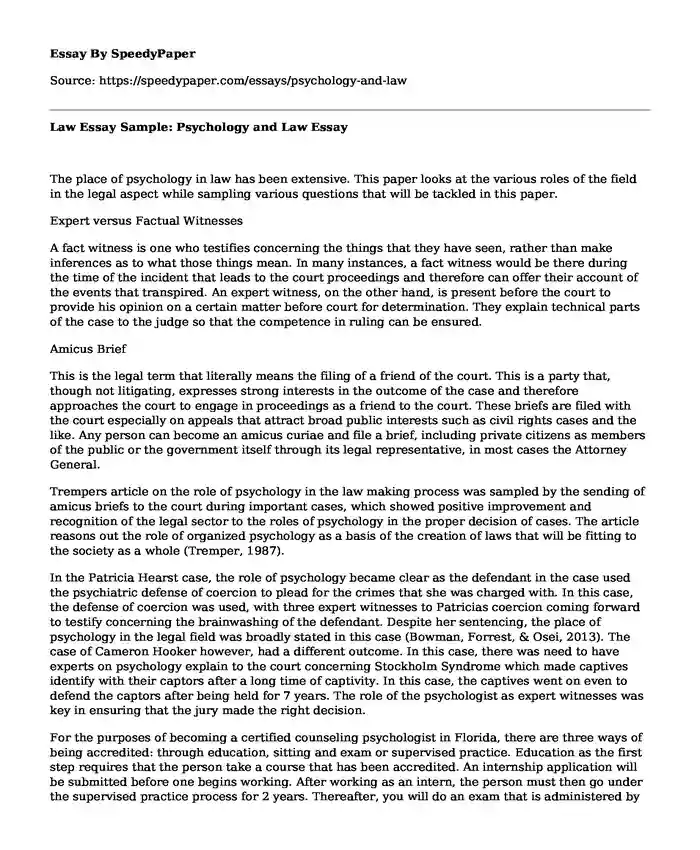
| Type of paper: | Essay |
| Categories: | Psychology Law |
| Pages: | 3 |
| Wordcount: | 816 words |
The place of psychology in law has been extensive. This paper looks at the various roles of the field in the legal aspect while sampling various questions that will be tackled in this paper.
Expert versus Factual Witnesses
A fact witness is one who testifies concerning the things that they have seen, rather than make inferences as to what those things mean. In many instances, a fact witness would be there during the time of the incident that leads to the court proceedings and therefore can offer their account of the events that transpired. An expert witness, on the other hand, is present before the court to provide his opinion on a certain matter before court for determination. They explain technical parts of the case to the judge so that the competence in ruling can be ensured.
Amicus Brief
This is the legal term that literally means the filing of a friend of the court. This is a party that, though not litigating, expresses strong interests in the outcome of the case and therefore approaches the court to engage in proceedings as a friend to the court. These briefs are filed with the court especially on appeals that attract broad public interests such as civil rights cases and the like. Any person can become an amicus curiae and file a brief, including private citizens as members of the public or the government itself through its legal representative, in most cases the Attorney General.
Trempers article on the role of psychology in the law making process was sampled by the sending of amicus briefs to the court during important cases, which showed positive improvement and recognition of the legal sector to the roles of psychology in the proper decision of cases. The article reasons out the role of organized psychology as a basis of the creation of laws that will be fitting to the society as a whole (Tremper, 1987).
In the Patricia Hearst case, the role of psychology became clear as the defendant in the case used the psychiatric defense of coercion to plead for the crimes that she was charged with. In this case, the defense of coercion was used, with three expert witnesses to Patricias coercion coming forward to testify concerning the brainwashing of the defendant. Despite her sentencing, the place of psychology in the legal field was broadly stated in this case (Bowman, Forrest, & Osei, 2013). The case of Cameron Hooker however, had a different outcome. In this case, there was need to have experts on psychology explain to the court concerning Stockholm Syndrome which made captives identify with their captors after a long time of captivity. In this case, the captives went on even to defend the captors after being held for 7 years. The role of the psychologist as expert witnesses was key in ensuring that the jury made the right decision.
For the purposes of becoming a certified counseling psychologist in Florida, there are three ways of being accredited: through education, sitting and exam or supervised practice. Education as the first step requires that the person take a course that has been accredited. An internship application will be submitted before one begins working. After working as an intern, the person must then go under the supervised practice process for 2 years. Thereafter, you will do an exam that is administered by NACREP. For practitioners in other states, one can get practicing license by applying for endorsement.
In the case study mentioned, the power differential issue becomes the one for concern. Because of the realization of the power status of the client, Dr. Takem recommends another situation of work, which is seen initially as a benefit to himself. However, with this consideration comes the thought that most relationships are based on power differentials and therefore the doctors realization of this and decision to change the amount and visiting hours is still ethical. Despite the power differential, the relationship doesnt become exploitative. This is the same situation that happens in the relationship between Dr. Search and his patient. The ability to corrupt the patient-doctor relationship is not based on the power difference, but rather the disposition for the doctor to corrupt. In this case, the doctor suspended the professional relationship and begun the intimate relationship, sowing that indeed he was not out to obtain the patient for selfish gains. Despite the satisfaction that he got as an old man, both were reported to be in a happy relationship. The act to withdraw the patient-doctor relationship to one of husband and wife validates the morality of the act.
References
Bowman, L., Forrest, D., & Osei, M. (2013). Social Science and Coercion as a Defense in Kidnapping Cases Patricia Hearst: Kidnap Victim to Criminal? . Retrieved from Cornell University Law School Social Sciences and the Law: http://courses2.cit.cornell.edu/sociallaw/student_projects/Kidnapping.html
Tremper, C. (1987). Organized psychology's efforts to influence judicial policy-making. American Psychologist, 496-501.
Cite this page
Law Essay Sample: Psychology and Law. (2020, Jun 18). Retrieved from https://speedypaper.com/essays/psychology-and-law
Request Removal
If you are the original author of this essay and no longer wish to have it published on the SpeedyPaper website, please click below to request its removal:
- Essay Example on the Article The Trouble With Fries
- Free Essay: Corps Commanders of the Bulge: The Victory of the USA
- Ethical Autobiography Essay Sample
- Addiction in Down These Mean Streets - Book Review Essay Sample
- Essay Sample Focusing on the Impacts of Climate Change on Wheat Production
- Essay Example on Blockchain Application
- Free Essay on Hybrid Maritime Threats
Popular categories




